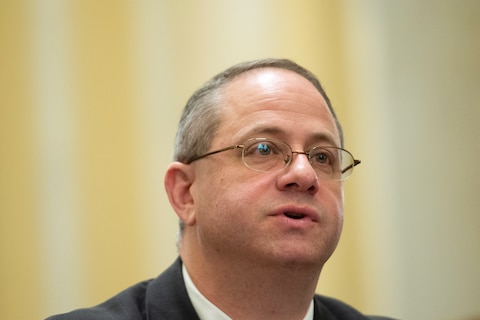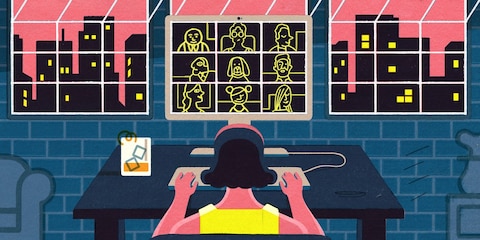Analysis | The Technology 202: Tech offices could look very different when employees return – The Washington Post
with Tonya Riley
Communal tables, shared espresso machines, open floor plans and tiny huddle rooms are the amenities that for years have defined many modern tech offices.
When workers return in the coronavirus era, the new hallmarks could be hand sanitizer, touch-free garbage cans and even Plexiglass barriers between workspaces.
“There’s going to be a lot of evolution of doing similar things but in a more physically distant way, in a more individually packaged way,” said Katie Drucker from Seattle-based Madrona Ventures, who has been working on building a “Back to Work” toolkit for companies. “I don’t think it means the end of ever being in an office.”

A nearly empty parking lot is shown on the Facebook campus in Menlo Park, Calif. (Jeff Chiu/AP)
The coronavirus pandemic is poised to forever change the layout of American offices.
As President Trump and governors across the country weigh plans to reopen the economy, tech companies across the country are scrambling to overhaul their offices. It is likely to result in a huge culture change for an industry that pioneered the open floor plans that have come to define many corporate offices today.
Qumulo, a Seattle-based start-up, plans to space its workstations more than six feet apart in all directions and reconfigure all its conference rooms to let employees maximize distance from each other. Robyn Singh, its vice president of people, says the company is considering many different scenarios, including taking offline popular perks such as the office espresso machine and panini press – at least initially. The company is also thinking about ways to cut down on employees using commonly-touched surfaces, such as door handles.
“The safety of our people, of any visitors or customers who come into the office, is our top priority,” Singh said. “Whatever we need to be implementing to maintain that within our offices, we will.”
The company is also starting to think about how to supply new essential items for the office, such as hand sanitizer, wipes and masks for employees.
Larger tech companies have far more resources to build back to work plans.
They are taking cues from their experiences dealing with other outbreaks such as SARS in Asia to develop their game plan for returning to work. And major tech companies with operations that have already restarted in Asia during the coronavirus crisis can incorporate those lessons from easing stay-at-home orders, too.
Intel for instance recently published a plan to return employees to work in phases after local authorities lift stay-at-home orders and see cases in the surrounding communities start to decline. Intel has a mix of different floor plans, with cubicles in some locations and open floor plans in others. The company is working through reconfiguring any work areas where people would be in close contact.
Venture capital firms could be a resource for smaller start-ups that don’t have the resources for pandemic planning.
The tool kit of resources for companies trying to plan how they’ll bring back workers from Madrona Ventures covers everything from how to instruct employees to clean down their work stations to technologies that could help monitor whether people are maintaining social distance. The kit also includes checklists for reconfiguring office space to ensure people can remain at least six feet apart. The recommendations are partially based on the findings of larger corporations in the Seattle area.
Drucker, the firm’s head of business development and partnerships, said it’s a starting point for companies that feel overwhelmed by all the changes they need make.
“It is meant to be walking a mile in the shoes of a business owner – these are the things you need to think about,” she said.
Many tech companies have already said they won’t bring back all employees for a long time.
Despite the emerging state guidelines for reopening, companies are making their own decisions. And tech workers may come back on slower timelines than many other businesses because so much of their work can be done remotely.
Most Facebook employees will be allowed to continue to work from home through the remainder of 2020, according to a CNBC’s Salvador Rodriguez. However the Menlo Park, Calif., company will begin to open most of its offices on July 6.
Microsoft has said that it would allow most employees to have the option to work remotely through October, unless employees are in an essential role or authorities mandate otherwise, GeekWire reports. Amazon has said workers who work remotely can continue to do so until at least October 2.
Other tech companies say they are closely watching the actions of government officials in locations where they have offices.
Our top tabs
Democratic senators pressed Amazon about the firings of workers who say the e-commerce giant retaliated against them.
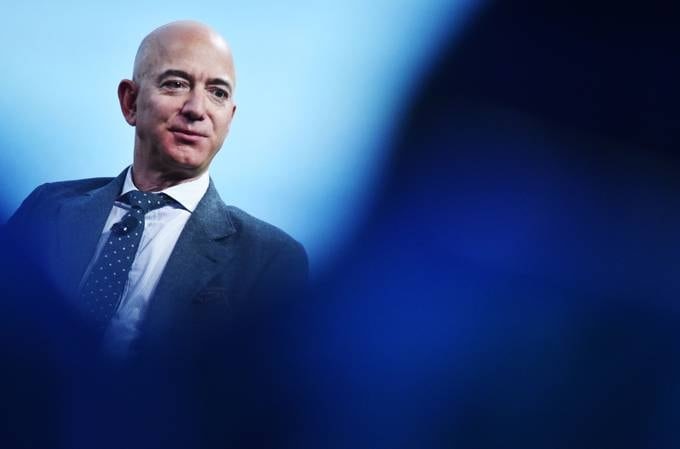
Jeff Bezos. (Mandel Ngan/AFP/Getty Images)
The letter cites the recent terminations of four employees, two warehouse and two corporate, who publicly spoke against the retail giant’s coronavirus response and climate change policies. (Amazon CEO Jeff Bezos owns The Washington Post.)
“In order to understand how the termination of employees that raised concerns about health and safety conditions did not constitute retaliation for whistleblowing, we are requesting information about Amazon’s policies regarding grounds for employee discipline and termination,” wrote Sen. Elizabeth Warren (D-Mass.) Other signatories include Sen. Bernie Sanders (I-Vt.), Cory Booker (D-N.J.), Kamala Harris (D-Calif.), Sherrod Brown (D-Ohio), Kirsten Gillibrand (D-N.Y), Ed Markey (D-Mass.), Richard Blumenthal (D-Conn.) and Tammy Baldwin (D-Wis.).
The letter also asks whether Amazon documents the protest efforts of individual employees or if it has implemented unionization risk assessments, which Whole Foods has reportedly used. The senators request a response by May 20.
“These individuals were not terminated for talking publicly about working conditions or safety, but rather, for violating—often repeatedly—policies, such as intimidation, physical distancing and more,” Maxine Tagay, an Amazon spokeswoman, said in a statement. “We look forward to explaining in more detail in our response to the Senators’ letter.”
Safety issues continue to plague workers. More than 100 warehouse employees have tested positive for covid-19 and at least three warehouse workers have died of the virus, according to the senators’ letter. More than 5,000 warehouse workers signed petitions yesterday urging the company to reinstate an unlimited paid leave policy it had temporarily introduced during the pandemic, which were delivered to the residences of Bezos and Amazon spokesman Jay Carney, Lauren Kaori Gurley at Vice reports.
Social media companies are scrambling to remove a viral coronavirus conspiracy theory video.
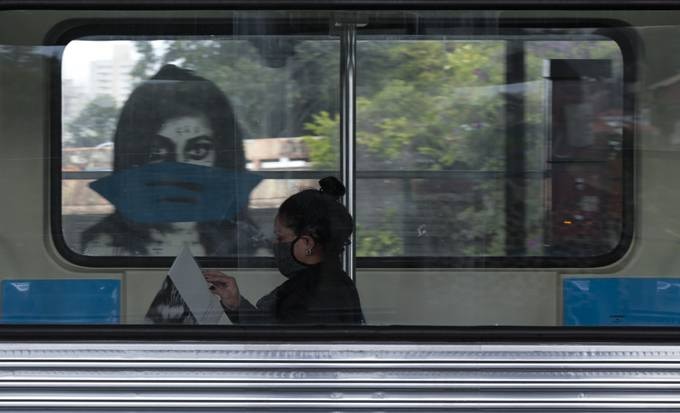
A woman wearing a face mask reads inside a subway. (Miguel Schincariol/Getty Images)
YouTube, Vimeo and Facebook have removed the 26-minute video, titled “Plandemic,” Travis M. Andrews reports. The video promotes conspiracies that billionaires helped spread the disease to promote vaccines and that wearing masks are harmful. It also used footage of Anthony S. Fauci, who is helping lead the response, out of context.
YouTube removes “content that includes medically unsubstantiated diagnostic advice for covid-19,” which includes the “Plandemic” video, the company told Travis. The video had 1.8 million views before it was removed. “Suggesting that wearing a mask can make you sick could lead to imminent harm, so we’re removing the video,” Facebook said in a statement.
Twitter, which like other platforms has made an effort to address coronavirus misinformation, did not remove a video interview of the filmmaker. But it has removed the hashtags #PlagueofCorruption and #PlandemicMovie from its searches and trends sections, the company said.
Tech billionaires are using their celebrity to pressure governments to prepare for the next pandemic.
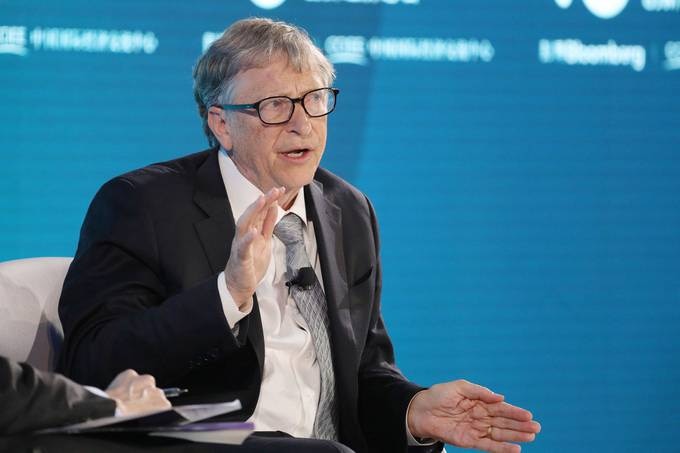
Bill Gates. (Takaaki Iwabu/Bloomberg News)
The group, called the Pandemic Action Network, is one of few initiatives to shape life after the pandemic that has a political advocacy mission, Theodore Schleifer at Recode reports. It has gained the support of Microsoft founder Bill Gates and former Google CEO Eric Schmidt.
The initiative is behind the #MaskingAFriend campaign, which has been taken up by high-profile individuals including former secretary of state Hillary Clinton.
View this post on Instagram
A post shared by Hillary Clinton (@hillaryclinton) on
The group, which is helmed by former Gates Foundation leader Gabrielle Fitzgerald, is focused on helping the World Health Organization bridge its funding gap after the coronavirus response.
“There’s a lot of talk of ‘this can’t happen again.’ But right now, all of the focus is on the response,” Fitzgerald said. “At some point very soon, we need to start looking ahead beyond the immediate crisis and start thinking about what mechanisms need to be put in place to make sure it doesn’t happen.”
Rant and rave
Amazon announced yesterday it would release an eight-part documentary series about workers on the front line in Los Angeles during the coronavirus pandemic. The Internet had some thoughts on the timing:
The Verge’s Casey Newton said:
The Los Angeles Times’s Suhauna Hussain:
The digital race to 2020
A comparison of the apps developed by the Trump and Biden campaigns highlights a stark difference in digital strategy.
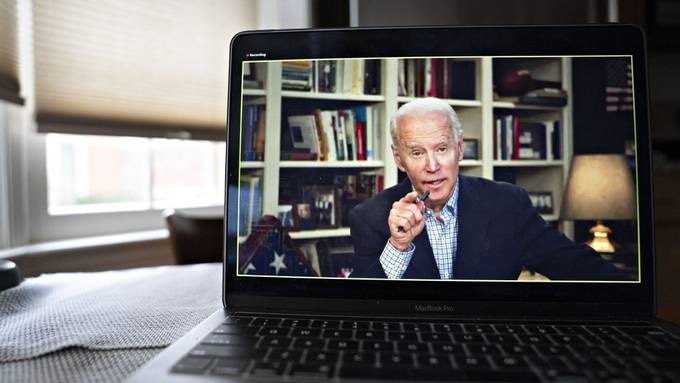
Former vice president Joe Biden speaks during a virtual media briefing on a laptop in Arlington, Va., in March. (Andrew Harrer/Bloomberg News)
“It was easy to forget that the Biden app existed,” Dave Weigel wrote of an an experiment comparing the two 2020 candidates’ apps. “Push texts were infrequent, and unlike the Trump app, the Biden app didn’t let me track virtual campaign events … If I wanted to volunteer, the app made it easier, but not addictive.”
By contrast, “Trump 2020 did not let me go so easily,” Dave wrote, noting join-up promotions, awards for signing up friends, and a host of programming and external media tailored to favor the president. “On the app was a world where the president’s agenda was so obviously successful that the media and Democrats had to lie and smear to cover it up.”
The different experience stress how far behind Biden’s technology is compared to even other Democrats, Dave notes. And it shows in the results: Trump recently had nine times as many views on a Cinco de Mayo broadcast on Facebook.
Agency scanner
The Federal Trade Commission continues to battle an onslaught of coronavirus-themed scams.
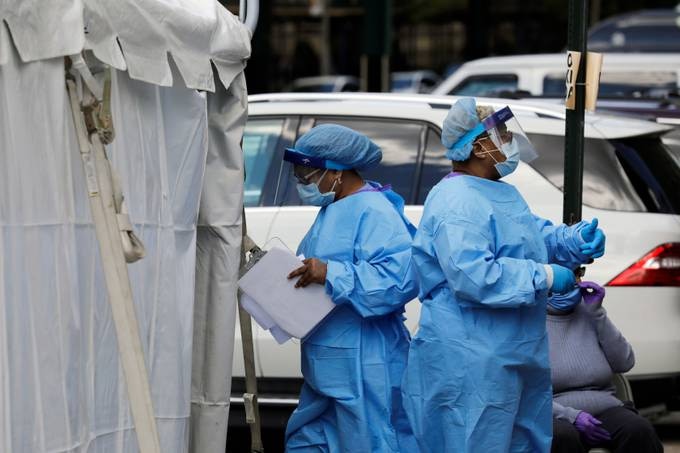
Health-care workers at a walk-up coronavirus testing site. (Peter Foley/EPA-EFE/Shutterstock)
The agency sent 45 letters to companies it said were hawking false coronavirus cures, bringing its total number of warnings to 120.
More agency news:
Politics
Senate committee advances nomination of FEC commissioner
The panel voted along party lines to advance President Trump’s nominee, conservative Texas lawyer James E. “Trey” Trainor III, to fill a vacancy on the Federal Election Commission.
Michelle Lee
Pentagon official: FCC decision on 5G threatens GPS, national security
Pentagon officials on Wednesday criticized the Federal Communications Commission’s (FCC) recent decision to allow Virginia-based satellite communications company Ligado to deploy a nationwide mobile network, saying that it could have adv
The Hill
Inside the industry
Uber is planning $1 billion in cost cuts to deal with losses incurred during the coronavirus pandemic, chief executive Dara Khosrowshahi told investors yesterday.
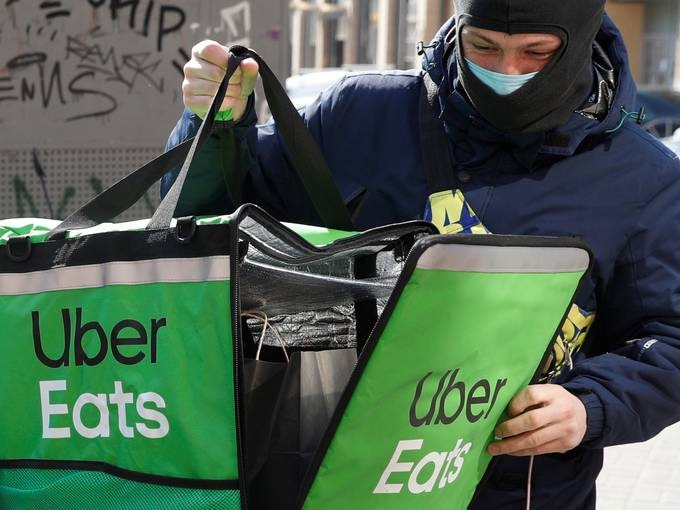
An Uber Eats courier. (Valentyn Ogirenko/Reuters)
Uber reported a net loss of nearly $3 billion this past quarter — nearly three times the losses a year earlier, Robert Wall at the Wall Street Journal reports. Uber Eats, the company’s food delivery service, grew 52 percent from last quarter to just over $4.5 billion.
Privacy monitor
Zoom pledged not to provide a back door to law enforcement for encrypted live meetings.
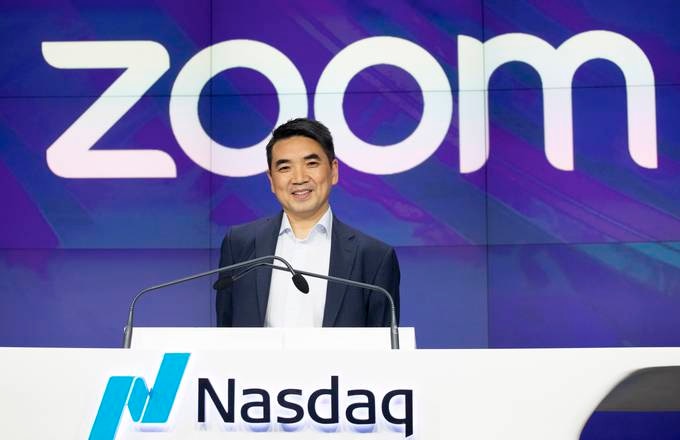
Zoom CEO Eric Yuan. (/Mark Lennihan/AP)
The company made the promise while announcing its acquisition of security start-up Keybase to ramp up its privacy offerings. The acquisition will help the embattled company build out its strong encryption offerings, which give communications a higher level of security.
But there’s a catch. Only paid accounts will have access to end-to-end encryption.
The company is also “investigating mechanisms that would allow enterprise users to provide additional levels of authentication,” but did not elaborate.
The changes help fulfill the requirements of an agreement the company reached with the New York attorney general yesterday to avoid further investigation.
The purchase follows a string of security incidents, including allegations that the company previously misled users and investors about the extent to which its calls were already encrypted. The company, which has seen millions of new users during the coronavirus pandemic, vowed to update its security and privacy features last month.
Trending
Internet Culture
Roker’s advice: “Don’t try to be Mr. or Ms. Talking Head. Just be you, and everything else will follow.”
Travis Andrews
Professional Networks Are Zooming Through the Coronavirus Pandemic
Many business groups are meeting online—some gatherings have excellent results, others fall flat.
Wall Street Journal
How ‘Karen’ Became a Coronavirus Villain
A popular joke about entitled white women is now a big pandemic meme.
The Atlantic
Bookmark this
A Shadow Medical Safety Net, Stretched to the Limit
In New York City and around the country, community health centers — which serve vulnerable, hard-to-reach populations — are being strained like never before.
The New York Times
Daybook
- The Senate Commerce Committee will host a hearing on the state of broadband amid the covid-19 pandemic on Wednesday at 10 a.m.
- The Information Technology and Innovation Foundation will host a webinar “Mind the Gap: A Design for a New Energy Technology Commercialization Foundation” on Wednesday at noon.
- The Open Technology Institute will host an event on the role of technology in pandemic response efforts on May 14 at 11:30 a.m.
Before you log off
Enjoy the weekend!

